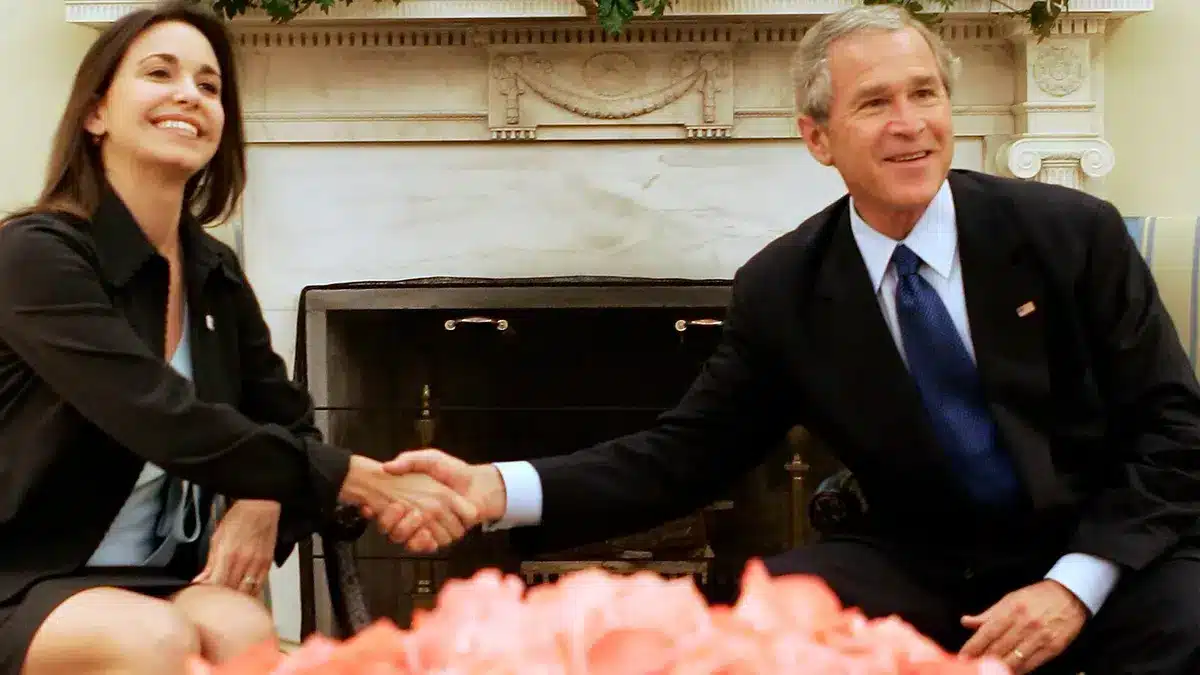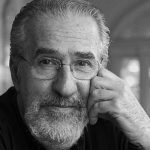
Former US President George W. Bush shakes hands with María Corina Machado (left), then executive director of Sumate, in the Oval Office of the White House in Washington, DC, May 31, 2005. Photo: Alex Wong/Getty Images/File photo.

Orinoco Tribune – News and opinion pieces about Venezuela and beyond
From Venezuela and made by Venezuelan Chavistas

Former US President George W. Bush shakes hands with María Corina Machado (left), then executive director of Sumate, in the Oval Office of the White House in Washington, DC, May 31, 2005. Photo: Alex Wong/Getty Images/File photo.
By Atilio A. Boron – Jul 9, 2023
Imagine a scenario where US House of Representatives congresswoman Alexandria Ocasio-Cortez had become fed up with Joe Biden’s irresponsible bluster (calling Xi Jinping a dictator, for example, after Blinken’s trip to “improve” relations with China) and had asked for help from a foreign power—let’s say, for example, Russia and China—to send a military expedition to the United States or to apply sanctions to the country with the purpose of conducting a “regime change” opetation, i.e. the de facto removal of Biden. What would have happened to her?
Let’s imagine something else: if the assault on the Capitol on January 6, 2021 had successfully culminated in the appointment of a new president—say Bob Menendez, to use the name of some American political scapegoat—and the most distinguished members of the establishment, including Ocasio-Cortez, had participated in the swearing-in, and they had all signed a book validating the legitimacy of the new president; what would have been the response of the US justice system?
Undoubtedly, her legal predicament would deteriorate considerably. It was not just about requesting foreign intervention against her country in order to—returning to the case of Venezuela and the case of María Corina Machado—overthrow a legitimate government such as that of Hugo Chávez; but she also took an active part in the legitimization of a usurper. Let’s say, hypothetically, Menendez was not able to stay in office because an immense popular mobilization reinstated Biden, and Ocasio-Cortez from that moment began to travel frequently to Moscow or Beijing to ask the Russian or Chinese authorities to collaborate with the violent protests that she and her colleagues were organizing (like the violent Venezuelan “guarimbas” of 2014 and 2017) that would leave a couple of hundred dead and wounded. And, let’s say she also asked those foreign leaders, firstly, to instate a complete blockade against any economic activities of the United States so that nothing could be exported or imported, and secondly, also to appoint a “president” in charge of the United States—let’s say the worthless Marco Rubio—and had decided upon, at Alexandria’s request, the expropriation of the assets of two gigantic companies such as CITGO and PDVSA. What do you think would have happened to her? Answer: she would have been immediately apprehended and imprisoned, and almost certainly punished by the US courts of with capital punishment or life imprisonment.
Let’s go back to Venezuela. María Corina went even further: on May 31, 2005, she met with then-President George W. Bush requesting support to end the “regime” of Hugo Chávez Frías. In 2014, she appeared before an OAS Assembly with the fictitious position of “alternate ambassador of Panama” to demand that the discredited institution harden its opposition to the Venezuelan government. In recent years, successive US governments financially supported various political formations that Machado created, as well as several NGOs with which she is linked or directs behind the scenes while requesting more aggressive action from Washington to attack Venezuela and put an end to Maduro.
Consistent with Machado and the anti-Chavista lobby’s intense activism, on March 8, 2015, Barack Obama issued an executive order declaring a “national emergency in the face of the unusual and extraordinary threat” that the Venezuelan government represented for the United States, laying the legal foundations for the imposition of harsh punitive measures against the South American country. This infamous decision was extended by Joe Biden, and since then, the US and other countries have applied a total of 929 “unilateral coercive measures” against Venezuela.
The economic cost of these sanctions is chilling: $7 billion frozen in banks; $5 billion detained in the International Monetary Fund; $2 billion in the form of 31 tons of gold deposited in the Bank of England and confiscated by the British government; $10 billion of CITGO Oil Corporation’s value confiscated by the US, plus the looting of PDVSA. The impact of these sanctions on exports was devastating. In 2012, the country’s exports amounted to a staggering 75,762.8 million Euros, but by 2021, it had plummeted to a mere 3,005 million Euros. Furthermore, a study conducted by Mark Weisbrot and Jeffrey Sachs indicates that the human cost during the first two years of the Trump administration alone reached 40,000 lives.
The actions of María Corina Machado (and those of Leopoldo López, Julio Borges, and Juan Guaidó) in requesting that the US government implement these policies against Venezuela clearly falls under the legal category of “treason.” The US Criminal Code establishes in Title 18, section 2381 that: “Whoever, owing allegiance to the United States, levies war against them or adheres to their enemies, giving them aid and comfort within the United States or elsewhere, is guilty of treason and shall suffer death, or shall be imprisoned not less than five years and fined under this title but not less than $10,000; and shall be incapable of holding any office under the United States.”
Therefore, what Corina Machado and her cronies did would have been punishable in the United States with the death penalty or, at least, with life imprisonment and disqualification from holding public office. Argentina’s Penal Code punishes this conduct with sentences ranging from 10 years to life imprisonment, with absolute disqualification for life to hold any public office. The Penal Code of Uruguay, which President Lacalle Pou should probably read, punishes conduct such as Machado’s with “10 to 30 years of penitentiary, and from two to 10 years of absolute disqualification.” In contrast, Venezuela’s justice system (not the president) issued a comparatively lenient punishment: only a 15- year disqualification for committing flagrant acts of treason. In the United States, Machado would already be on death row in a maximum security prison. Meanwhile, the dominant Latin American media continues to focus on the exclusion from the electoral contest of an individual who in any other country would have already been incarcerated.
Translation: Orinoco Tribune
OT/JRE/KZ

Atilio A. Borón is a Harvard Graduate professor of political theory at the University of Buenos Aires and was executive secretary of the Latin American Council of Social Sciences (CLACSO). He has published widely in several languages a variety of books and articles on political theory and philosophy, social theory, and comparative studies on the capitalist development in the periphery. He is an international analyst, writer and journalist and profoundly Latinoamerican.